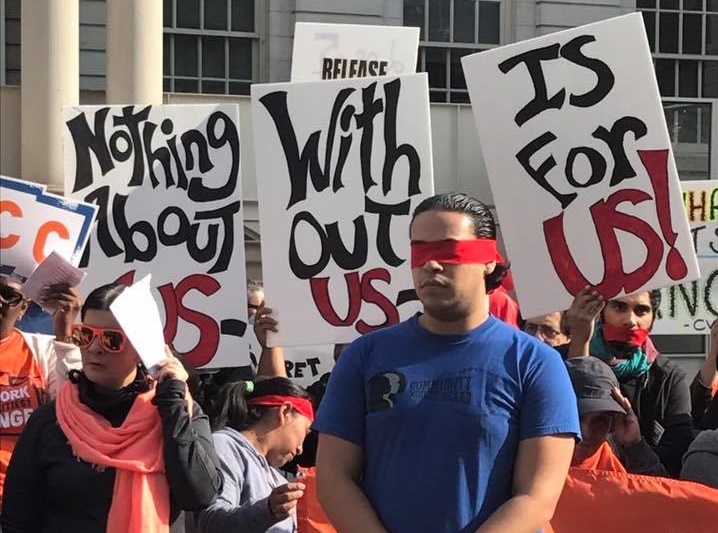
CVH
A protest at City Hall in October called for more disclosures by NYCHA on potential development sites.
NYCHA residents and advocacy groups continue to press the de Blasio administration for more information on plans to develop public-housing land.
Community Voices Heard rallied on the steps of City Hall last month demanding that the housing authority release the full list of NYCHA properties that have been identified as potential sites for new development. And a group of stakeholders at one of the sites that has been named, Wyckoff Gardens in Boerum Hill, last week pressed NYCHA to reveal more about the proposed mixed-use development there.
No one doubts NYCHA needs money: The nation’s oldest and largest public-housing authority has been cheated by all levels of government for years, making operating funds tight and leaving billions of dollars worth of repairs undone. At the same time, the de Blasio administration needs land to build some of the 80,000 new units of income-targeted housing under its Housing New York plan.
The NextGeneration NYCHA strategy unveiled in 2014 aims to use one problem to solve another by erecting new buildings containing affordable housing on some NYCHA campuses. Some will be composed exclusively of income-targeted housing, while others will offer a 50-50 mix of market-rate and affordable apartments. The developments would generate lease payments to NYCHA, helping to shore up the agency’s finances.
The de Blasio administration says the plan is the only way to close NYCHA’s enormous budget gap. But skeptics fear the new development, even the “affordable” apartments, will foment gentrification and reduce NYCHA tenants’ quality of life. (Some critics say they fear NYCHA will privatize public housing, but the development plans involve the leasing of land, not its sale.)
NYCHA says it has identified 80 “strong neighborhoods” where development might make sense but has publicly named only six. In May, NYCHA announced the selection of developers for three of the 100-percent affordable developments—at Van Dyke Houses in Brownsvile, Ingersoll Houses in Fort Greene and Mill Brook Houses in Mott Haven—encompassing 489 new apartments. Bids for the next round of development, encompassing the 50-50 projects at Wyckoff Gardens and Holmes Towers or on a 100-percent affordable development at Betances Houses V and VI in Mott Haven, were due September 30. Citing procurement rules, NYCHA wouldn’t say who the bidders were.
Critics say the lack of transparency is a problem. “Public housing residents and community leaders must know what the administration has planned for our communities,” CVH said in a statement about its October 20 action, at which some residents wore blindfolds or gags for dramatic effect. “Nothing about us, without us is for us. Show us how good this plan is for the community, by releasing the list.”
NYCHA declined to do so. A NYCHA spokesperson told City Limits: “We will not privatize public housing or displace residents. For decades, NYCHA residents have lived with the effects of disinvestment in public housing. NextGenNYCHA presents a practical plan to preserve this housing for today and tomorrow’s residents. We have made a commitment to engage with residents first as we work with them and all levels of government to preserve this vital housing resource.”
At Wyckoff Gardens, a stakeholder group of residents and advocates is meeting every two weeks and getting together regularly with NYCHA officials. But there’s disagreement between at least some of the stakeholders and the authority on how much information the stakeholders will get as NYCHA moves toward selecting a developer for the Wyckoff project. At a meeting last week, according to FUREE program coordinator Shatia Strother, stakeholders asked to see a projection of the revenue the development is expected to generate. They also asked for an updated capital-needs assessment for Wyckoff.
“We want to get a sense of what the repairs are and what they’re going to cost, of whether the needs at Wyckoff warrant permitting development on that land,” Strother tells City Limits.
NYCHA didn’t say whether it would provide that information. It did say that a subcommittee of stakeholders could weigh in on which bid they preferred, but members would have to sign a nondisclosure agreement and the group would be restricted to residents, meaning advocates from FUREE and Fifth Avenue Committee would be excluded. One rationale for that exclusion is that Fifth Avenue Committee has bid on the project, but Strother says other stakeholders had no role in preparing or reviewing that bid. “They are definitely trying to keep us out of the loop,” she says.
The NYCHA spokesperson says, “The review committee is reserved for residents because of the unique perspective they have to offer since this project will impact them most directly.”
NYCHA adds that even having a stakeholder committee is an “unprecedented” step. But then again, so is the NextGeneration development push.
City Limits coverage of housing and development is supported by the New York Community Trust and the Charles H. Revson Foundation.









2 thoughts on “NYCHA Pressed on Two Fronts for Details on Development Scheme”
NYCHA is a total disaster and they can do what they want with their properties. But as bad as the NYCHA is they shouldn’t totally ignore tenants wishes when it comes to these development proposals.
Found this info on the city website. It shows the percent of land covered by buildings at each NYCHA development. I’m just guessing but I think that NYCHA will target the development with the smallest build coverage for market/mixed use developments:
https://files.acrobat.com/a/preview/5ad9b5b1-e2b5-4bfa-a49d-1a9687e88fee
Pingback: Op-ed: Rejecting the East Harlem ‘Community’ Plan | City Limits